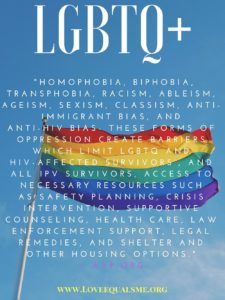Written by Rachael Atkinson Millmoor of Victim First
June is Pride Month – the perfect time to celebrate. However it is also the perfect time to bring to light elements related to the experiences of those who identify as lesbian, gay, bisexual or transgender in addition to identities including queer, intersex, asexual, demisexual, non-binary, gender fluid, pansexual, polyamorous, questioning and many more (LGBT+). These experiences are often forgotten or overlooked and often areas such as LGBT+ domestic and sexual violence are not spoken about in as much detail. Therefore, I have been asked by UK SAYS NO MORE to put together a short blog post on elements of domestic violence that are unique to LGBT+ people.
Across the UK and wider, domestic abuse and sexual violence is becoming a much more talked about topic, more campaigns are coming forward and people are starting to realise the gravity of what victims experience. This is amazing and should never be overshadowed; however, it can often be talked about in the singularity of Male on Female abuse.
Research:
In 2018, SafeLives, in connection with Galop and Stonewall, released the report: Free To Be Safe: LGBT+ people experiencing domestic abuse which studied the kinds of abuse that LGBT+ experience. The most prevalent type of abuse was shown to be ‘jealous and controlling behaviour’, which can be equated with some of the unique styles of abuse used specifically against LGBT+ people.
Using someone’s gender identity or sexual orientation against them is a prevalent form of abuse used against LGBT+ people, which can include ridiculing their gender identity as a form of emotional abuse and manipulation. Within the Safelives 2018 report, it states that 51% of transgender people who had experienced domestic violence in the last year reported that their partner had ridiculed their gender identity. This can include using the incorrect pronouns, forcing someone to live in the gender they do not identify with or creating barriers to medical help (both in regards to sexual violence or physical domestic abuse but also gender clinics etc.).
Barriers to Support:
Outing someone, as depicted in this video, can be used to control someone into complying with their abuser – “Do this or I’ll tell your family that you’re gay”. This manipulation tactic is especially damaging to those who either are exploring their identity, are not out to their family and friends or have expressed concerns that they will receive backlash from certain people due to their orientation or identity.
Another thing that LGBT+ people face when experiencing domestic violence is heightened barriers to support. If someone is not comfortably out as LGBT+, they may face a struggle in speaking to any service, including the police, about abuse experienced in a same sex relationship. Alongside this, organisations that provide that support may have a lack of understanding of LGBT+ people and the issues that they may face, which may prove damaging. Education of frontline staff is incredibly important in reducing the barriers for LGBT+ people, which may stop them leaving a dangerous relationship.
Accessing refuge services has been shown to be difficult for those who identify as transgender; for example if someone hasn’t undergone gender reassignment surgery, or does not intend to, they can face additional challenges when trying to access specialist domestic abuse support or sexual assault referral centres. Thankfully, this is improving, as frontline staff are more educated on how to support transgender service users.
There are many other unique barriers that LGBT+ people face when seeking support for domestic or sexual violence, however, the best thing that services can do is challenge their own bias and understanding to further educate themselves on these issues. Be a loud, visible ally to your service users and create an environment where they can speak without judgement. Frontline staff and services are the best starting point for reducing barriers for domestic and sexual violence victims so that they can access the best support possible to protect themselves and their families.
Find Out More
Rachael Atkinson Millmoor is a Senior Caseworker at Victim First
@RachaelMillmoor
LGBTQ+ Domestic Abuse and Sexual Violence



